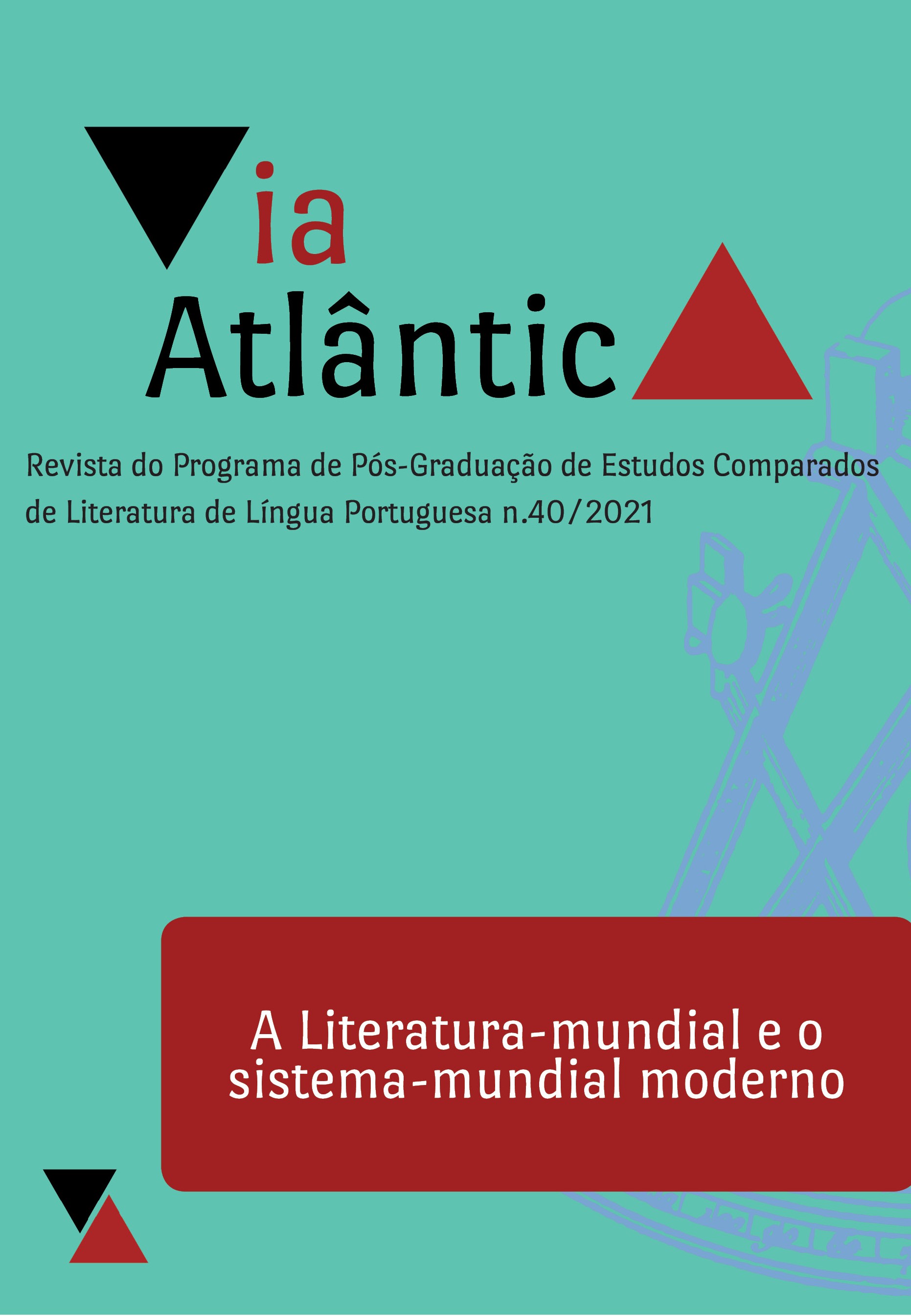“An Underdeveloped James Bond” and a “Rectangular Head": uneven and Combined Aesthetics in Pepetela and Mabanckou
DOI:
https://doi.org/10.11606/va.i40.173463Keywords:
World-literature, Narrative form, PeripheriesAbstract
This essay offers a case study of world-literary comparativism by considering two contemporary fictions from semi-peripheries, Congolese Alain Mabanckou’s African Psycho (2003) and Angolan Pepetela’s Jaime Bunda, Agente Secreto (2001), which both employ “imperfect” narrators with comically exaggerated bodies whose physical asymmetries employ a somatic semiotics that satirically embodies the affects and bodily habitus associated with uneven and uneven development, with corresponding asymmetries in plot, narration, and form. Both texts self-consciously appropriate and reinvent narratological devices from earlier writers from semi-peripheral situations, including Machado and Dostoevsky. These narratological innovations are welded to uneven aesthetics that combine generic elements of crime, detective, and thriller fiction. I argue that the “failed narrator” prominent in the fictions of Pepetela and Mabanckou can be interpreted as a formal device mediating the social pressures of uneven development across multiple socio-temporal contexts and I will compare its contemporary use in these two different contexts of postcolonial African nations in light of earlier semiperipheral locations of literary production, considering Pepetela’s Luanda and Mabanckou’s Brazzaville in reference to Dostoevsky’s St. Petersburg, Herman Ungar’s Prague-Boskovice, and Machado’s Rio de Janeiro.
Downloads
References
Anderson, P. (1984) “Modernity and Revolution,” New Left Review 1.144.
Bakhtin, M. (1984) Problems of Dostoevsky's Poetics, ed. and tr. Caryl Emerson. Minneapolis: University of Minnesota Press.
Brown, N. (2005) Utopian Generations: The Political Horizon of Twentieth-Century Literature, Princeton: PUP.
Casanova, P. (2004) The World Republic of Letters, trans. M. B. DeBevoise, Harvard: HUP.
Gledson, J. (1984) The Deceptive Realism of Machado de Assis: A Dissenting Interpretation of Dom Casmurro, Liverpool: Francis Cairns.
Henighan, S. (2006) “’Um James Bond Subdesenvolvido’: The Ideological Work of the Angolan Detective in Pepetela’s Jaime Bunda Novels,” Portuguese Studies, 22.1: 135-152.
Lukacs, Georg. (1973) Marxism and Human Liberation: Essays on History, Culture and Revolution by Georg Lukacs, trans. Rene Wellek, New York: Dell.
Kujundzic, D. (2000) “‘After’ Russian Post-Colonial Identity,” MLN, 115.5: 892-908.
Jameson. F. (1995) Postmodernism, or, The Cultural Logic of Late Capitalism [1991], Durham: Duke University Press.
Jameson. F. (2002) A Singular Modernity: Essay on the Ontology of the Present, London and New York: Verso.
Mabanckou, A. (2008) African Psycho, trans. Christine Schwartz Hartley, London: Serpent’s Tail.
Machado de Assis, J.M. (1997) The Posthumous Memoirs of Brás Cubas, trans. Gregory Rabassa, Oxford: OUP.
Marechera, D. (1987) “The Writer’s Experience of African Literature,” Zambezia XIV.ii: 99-111.
Moretti, F. (2000) “Conjectures on World Literature,” New Left Review, 1: http://www.newleftreview.org/A2094
Moretti, F. (2005) Signs Taken for Wonders, London: Verso.
Pearson, N. and M. Singer, eds. (2009) Detective Fiction in a Postcolonial and Transnational World, Farnham: Ashgate.
Pepetela. (2001) Jaime Bunda, Secret Agent: Story of Various Mysteries, trans. Richard Bartlett, Wiltshire: Aflame.
Pepetela. (2005) The Return of the Water Spirit, trans. Luís R. Mitras, Oxford: Heinemann.
Ricoeur, P. (1978) The Rule of Metaphor: Multi-disciplinary Studies of the Creation of Meaning in Language, trans. Robert Czerny with Kathleen McLaughlin and John Costello, London: Routledge.
Ricoeur, P. (1981) “What is a Text? Explanation and Understanding,” in John B. Thompson (ed.) Hermeneutics and the Human Sciences: Essays on language and Interpretation, Cambridge: CUP, 145-64.
Ribeiro Secco, C.L.T. (2003) “Entre Crimes, detetives e mistérios... (Pepetela e Mia Couto: riso, melancolia e o desvendamento da história pela ficção).” Revista Eletrõnica do Instituto de Humanidades, 2.5: http://publicacoes.unigranrio.com.br/index.php/reihm/issue/view/5
Schwarz, R. (1992) Misplaced Ideas: Essays on Brazilian Culture, ed. John Gledson, London: Verso.
Siddiqi, Y. (2002) “Police and Postcolonial Rationality in Amitav Ghosh's The Circle of Reason,” Cultural Critique, 50: 175-211.
Trotsky, L. (1967) History of the Russian Revolution [1932-33]. Vol. 1. trans. Max Eastman, London: Sphere Books.
Ungar, H. (2006) Boys and Murderers, trans. Isabel Fargo Cole, Prague: Twisted Spoon.
Warwick Research Collective (2015) Combined and Uneven Development: Towards a New Theory of World-Literature. Liverpool: Liverpool University Press.
Downloads
Published
Issue
Section
License
Copyright (c) 2021 Share Deckard

This work is licensed under a Creative Commons Attribution 4.0 International License.
Authors who publish with this journal agree to the following terms:
- Authors retain copyright and grant the journal right of first publication with the work simultaneously licensed under a Creative Commons Attribution License that allows others to share the work with an acknowledgement of the work's authorship and initial publication in this journal.
- Authors are able to enter into separate, additional contractual arrangements for the non-exclusive distribution of the journal's published version of the work (e.g., post it to an institutional repository or publish it in a book), with an acknowledgement of its initial publication in this journal.
- Authors are permitted and encouraged to post their work online (e.g., in institutional repositories or on their website) prior to and during the submission process, as it can lead to productive exchanges, as well as earlier and greater citation of published work (See The Effect of Open Access).






















